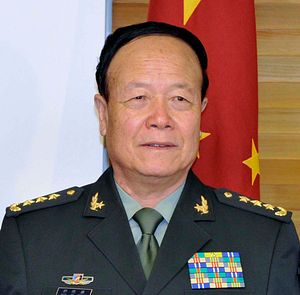China’s anti-corruption campaign is kicking into high gear again. Ten days after Ling Jihua, who served as a close aide to former President Hu Jintao, was officially expelled from the Chinese Communist Party, another high-ranking official was stripped of Party membership. The target this time: General Guo Boxiong, who served as vice chairman of the Central Military Commission (CMC) from 2002 to 2012. Like Ling, Guo’s case will now be turned over to prosecutors for trial.
Also like Ling, Guo was rumored to be under investigation long before official Party sources confirmed it. Guo’s son, General Guo Zhenggang, was included on a March 2 list of 14 generals under investigation for corruption. That was seen as a strong hint that the elder Guo would be next.
According to the announcement from Xinhua, China’s Politburo made the decision to oust Guo based on a report from the CMC’s disciplinary inspection authority. That report concluded that Guo’s “acts seriously violated the CPC’s discipline and left a vile impact.” He was accused of accepting bribes and taking advantage of his position to secure promotions or other benefits for others.
With Guo’s expulsion from the Party, both the vice chairs of the CMC during the Hu era have fallen. Guo’s fellow vice chairman, Xu Caihou, held that position from 2004 to 2012. That means the two highest military officers under Xi Jinping’s predecessor have now been drummed out of the Party in disgrace. Xu passed away on March 15 of this year, before his case went to trial. Guo and Xu are the two highest-ranking military officers to be publicly disciplined for corruption.
The public move against Guo comes less than two weeks after Xi gave a speech urging the People’s Liberation Army to “thoroughly purge the influence of the Xu Caihou case from thoughts, politics, organization, and work styles.” Speaking in Changchun, the capital of Jilin province and site of a lengthy siege by the PLA during the Chinese civil war, Xi urged PLA soldiers to return to the tradition of their civil-war era counterparts, the Red Army.
“The harm Xu Caihou’s illegal and anti-disciplinary behavior did to the construction of the armed forces was comprehensive and deep,” Xi said. To move forward, he said, the PLA must “recover, preserve, and fully use the glorious traditions and fine work styles of the old Red Army, making the armed forces even more pure and strong and knitting the numerous officers tightly together underneath the Party’s flag.”
This is similar to the rhetoric used in the general anti-corruption campaign, but different in one crucial aspect. When it comes to PLA corruption, China’s leaders recognize corruption as a direct national security threat. Corruption impacts the armed forces in myriad ways – siphoning off defense funds to line the pockets of officers; ensuring promotions for the rich rather than the talented; and generally contributing to a lack of discipline.
Most concerning for the CCP, patronage networks formed around corrupt officers threaten to undermine Party leadership in favor of personal loyalty to a specific commander. Fighting corruption in the PLA is thus seen as vital not only to the country’s national security, but to the Party’s control over the armed forces.
When asked about Xi’s speech in a regular press conference, Defense Ministry spokesperson Yang Yujun said that “to have the anti-corruption campaign in the military is to purify the environment in the military and improve the combat effectiveness.” Anti-corruption efforts are directly connected to the PLA’s main goal, improving “the capability of winning wars and battle.”
The relationship between those goals was clear in the Politburo statement on Guo’s ouster, which urged the armed forces to prioritize “ideological improvement, training troops, enhancing combat readiness, strictly governing themselves and setting a good example.” Notably, “ideological improvement” (which means both improving “work styles” and strengthening Party loyalty) comes first, before “training troops” and “enhancing combat readiness.”
































